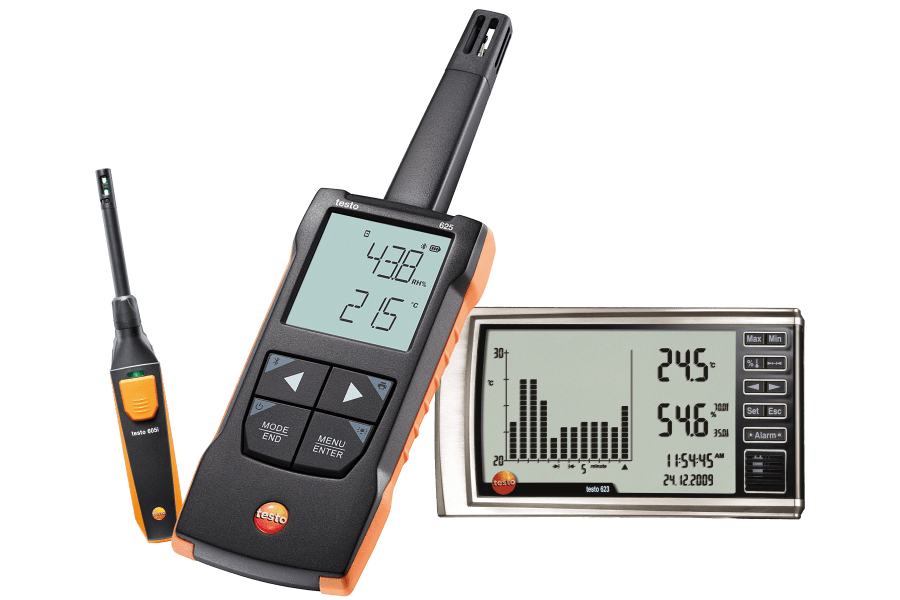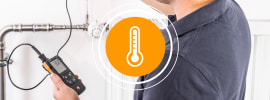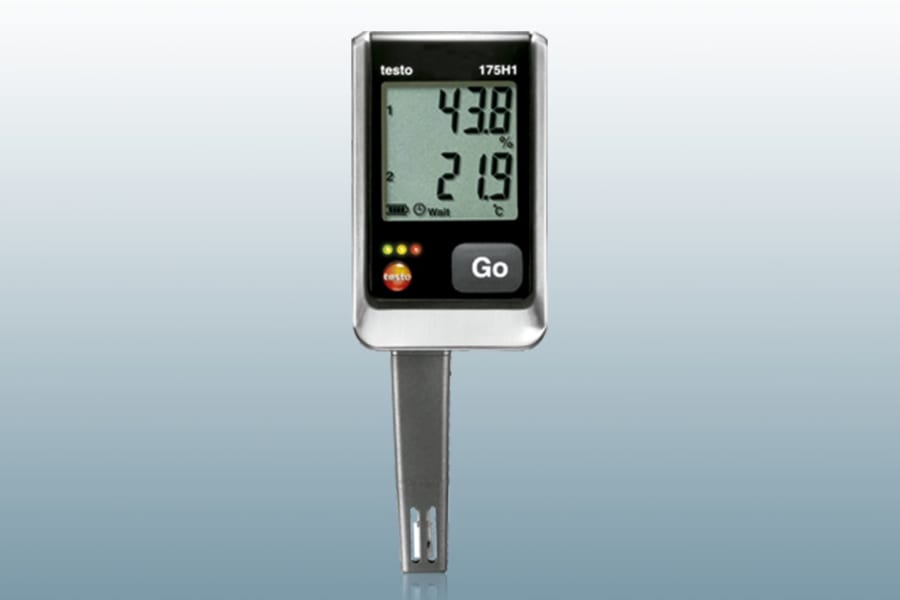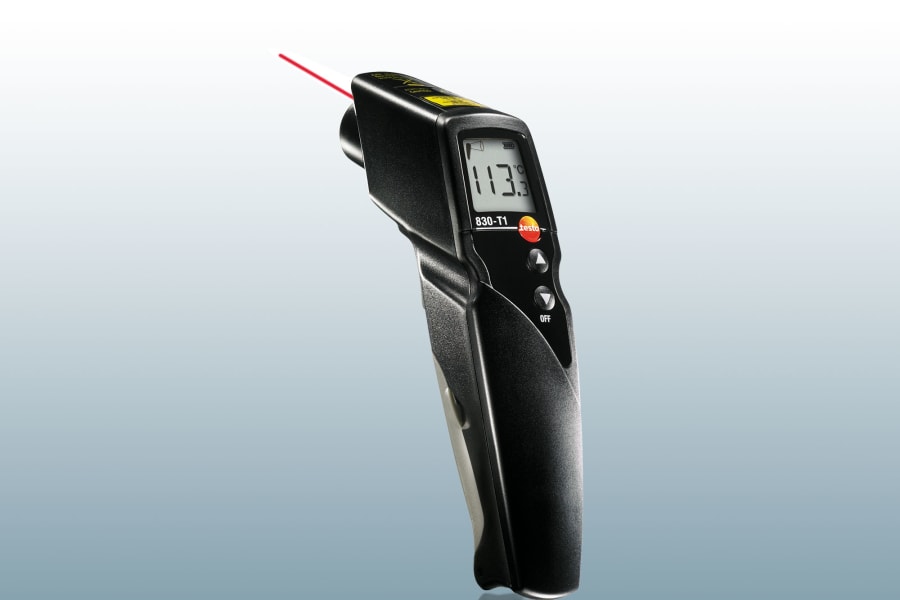Humidity meter
Meet the highest demands: cutting-edge technology from Testo
Air humidity is one of the most important measurement parameters. Depending on the application, different performance requirements are made when it comes to a humidity meter. That is why Testo offers an unbeatable diversity of instruments: from the simple humidity meter, via thermohygrometers and multifunction measuring instruments, through to the humidity data logger with software.

Outstanding performance: humidity measurement with Testo
A Testo humidity meter offers you all-round outstanding quality:
Extremely long-term stability of Testo's humidity sensor technology in every humidity meter.
Highly sensitive integrated or external probes for humidity measurement, even in complex environments.
Robust, compact housings with large, illuminated display.
Special technology for critical applications in industry, research or special high humidity areas.
Contact us.
Do you have any questions? We'll be happy to help.
Everything is possible: measure air humidity with Testo
More efficiency always implies: the right humidity meter
Measuring humidity in rooms
Register now for the five-part know-how series "Air humidity in rooms" and you will easily receive these technical papers as a free download by e-mail. Free of charge and without obligation.

Humidity is so important for a good indoor climate
Humidity in European regulations
Humidity, the new reference variable?
Thermodynamics and enthalpy
And much more ...
What does a Testo humidity meter measure?
A humidity meter records the water vapour content of the air. The warmer the air, the more water vapour it can absorb before it becomes saturated and reaches maximum air humidity.
Relative humidity is the most commonly measured value. It indicates the air humidity present in the room in relation to the maximum air humidity. It is given in "percent relative humidity" (% RH). This means for example that the comfort level range is between 30% RH and 65% RH.
On the other hand, absolute air humidity indicates the quantity of water vapour in a sealed volume of 1 m³. It is expressed in grams per cubic meter (g/m³), for example to document the removal of humidity in drying processes.
The dewpoint is also an element of air humidity. It indicates the temperature to which the air has to be cooled for condensation to occur. If the process temperature for instance falls below the dewpoint, condensate develops.
Air humidity in rooms – you should keep an eye on this
The air humidity in a room depends on several factors. It is important to keep an eye on the following elements in order to ensure optimum air humidity over the long term:
Production of humidity in the room, for example by the number of employees in an office.
Ventilation behaviour: how often ventilation is used and how high the humidity and temperature of the circulating outside air are.
Ability of walls and furnishings to absorb humidity.
Transport of humidity by external building components.
Know-how: this is how to choose your ideal humidity meter
The requirements for humidity measurement vary: no matter whether it involves air velocity & IAQ measurement or the cold chain, industrial moisture measurement or cleanrooms. Depending on the measuring task, either a conventional humidity meter or a complex system which handles critical applications effortlessly and reliably is the right one for you. So, the ideal humidity meter does not have to outclass absolutely every other one in technical terms. It needs to provide you with optimum support for your specific task:
Comfort level is an important parameter for setting heating and ventilation systems. Relative humidity and temperature are the crucial parameters for monitoring the thermal comfort level. In this respect, relative indoor humidity should range between 30% and 65%.
Mould is not always a consequence of structural damage, but can occur due to incorrect ventilation behaviour. Handy thermohygrometers or thermal imagers with a special humidity image measuring mode are suitable for mould measurement. With a humidity meter which calculates the dewpoint, you can also locate susceptible areas where there is a risk of condensation.
Where archiving, storage or comfort level are involved, humidity measurement over longer periods of time is of major importance. A Testo humidity data logger is ideal for long-term data measurement. This allows effortless handling of the high-precision, long-term measurement and documentation of air humidity values.
A Testo material moisture meter is very practical in terms of controlling storage and drying conditions. It measures the moisture of building materials and timber in a non-destructive way using thin, high-performance penetration needles. Special models also enable air humidity measurement. You can thus detect the causes quickly and thoroughly when humidity levels are too high.

Air humidity in rooms – you should keep an eye on this
The air humidity in a room depends on several factors. It is important to keep an eye on the following elements in order to ensure optimum air humidity over the long term:
Production of humidity in the room, for example by the number of employees in an office.
Ventilation behaviour: how often ventilation is used and how high the humidity and temperature of the circulating outside air are.
Ability of walls and furnishings to absorb humidity.
Transport of humidity by external building components.

Measure air humidity – measuring tips for even greater precision
A Testo humidity meter is easy to operate and highly precise. The following tips will enable you to get the best out of your humidity meter:
Adhere to the measuring distance from colder surfaces.
Set the probe up in the middle of the room at a height of about 60 cm.
Move the humidity meter gently to and fro during the measuring process in order to keep the acclimatization time as short as possible.
Do not breathe on the sensor. Warm breath can falsify the humidity measurement.

More moisture meters from Testo
When humidity measurement is not everything:
No matter whether it involves a warehouse, an office or a house – Testo's high-precision humidity data loggers are particularly suitable for measuring humidity in rooms. They also exist as small, compact mini data loggers for measurement in public buildings, such as museums or libraries.
Determining the moisture in building materials and timber is part of daily routine in many different areas of work. A reliable material moisture meter enables you to locate mould, structural moisture damage or incorrectly stored wood.
Are you looking for a measuring instrument that doesn't just deal with humidity, but records, documents and analyzes all parameters relevant to VAC? Then we recommend you use Testo's multifunction measuring instruments. Carry out all the measurements involved in setting air conditioning and ventilation systems or monitoring air quality with just one instrument. Our wide range of probes ensures that you are ideally equipped for your measuring tasks.
Non-contact temperature and humidity measurement – an infrared thermometer with humidity measurement enables you to determine temperature, humidity and, depending on the model, even more parameters, such as dewpoint.






























